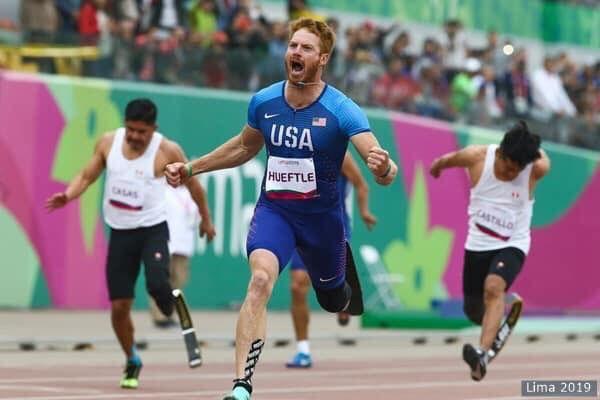Running and track are helping Nebraska rancher Kevan Hueftle of Eustice to live the kind of story that few people get to tell. He rose from the depths of a 2005 hunting accident that cost him his foot, as well as the resulting depression and subsequent battle with alcohol to become a champion Paralympic runner after recently competing.
“I was shot in the left foot during a hunting accident,” he recalled. “Six months later, I decided to amputate it right above the ankle. I was only 20 years old at the time. I was a successful track athlete and actually tried to go and run again at the University of Nebraska-Kearney. However, I hadn’t finished healing yet.”

In his words, Hueftle said he was “taking pills to get through the day” and “drinking more and more” at that time. He transferred out of UNK and went to Southeast Community College in Beatrice to get his Ag Degree in 2009. Between 2007 and 2015, Hueftle called himself a “full-blown alcoholic.” On August 7, 2015, he took control of his life and gave up alcohol. “I hit my four-year sobriety mark on August 7 of this year,” he said proudly.
In January of 2017, he started looking back at his track career, remembering how fast he could run in his prime. “I started taking a look at some of the Paralympic times,” he recalled. “I went to a prosthetic maker in Kearney and switched the old prosthetic leg over to a new one. Then, I started running again.
“My times were pretty crappy back then,” Hueftle said. “They were good when you remember I had just started running for the first time in fifteen years. As I got further into training, I went to a prosthetist in Washington that put me on a brand-new leg. I was training every single day and my times kept getting faster. Two-and-a-half years of training led to me getting a bid to the Para Pan-American Games in Peru, which were held only a month ago.”
He said it was a very emotional experience when he finally received his Team USA gear and became a part of the organization. While traveling to Peru he didn’t carry a lot of expectations with him. After all, Hueftle had never traveled internationally before. He was also running while being a full-time rancher with a couple of “side-businesses.” Plus, Hueftle was a 34-year-old runner competing against kids in their 20s.
“I think the cards were stacked against me,” he recalled. “However, I ended up placing second in the 200-Meter Dash and won the 100-Meter Dash. That was a great feeling. I was actually pretty mad at myself after the 200 because I thought I should have won it. I just didn’t quite run my best 200 of the year though.
“I wasn’t a 100 or 200 runner in college during my track days,” Hueftle said. “I was more of a 400 and 800M runner, which is a completely different style of running than the sprints. I had to learn some new running techniques and (starting) blockwork.”
Hueftle has a running coach who lives in Florida. His coach came to watch him run in Peru and it was actually the first time the two had been face-to-face. “I had five days on the track with him, which was amazing,” he said. “And having the national anthem played because you won a race was even more amazing. It was all Team USA members on the podium in first, second, and third, in both events.”
Hueftle met his coach during a trip to Arizona for competition. He does his training through videos and workouts that are sent from Florida. “My coach also works with Team USA,” he said. “He sought me out after the meet in Arizona and told me I had the skills and the mindset to do well in the competitions. I just didn’t quite have the running technique yet.”
With his win at the Para Pan-American Games in Peru, Hueftle is off to Dubai and running in the World Championship Meet at the end of the month. He leaves on October 31 for 17 days in Dubai. He has a lot of training to do between now and then, but Hueftle’s workouts can be difficult to fit into his hectic personal and professional schedule.
“I usually try to work out at 5 am,” he said, “but if that doesn’t work out, I usually head up to the high school in the evenings with my kids to do my running. I can also leave Eustice to drive to Cozad and use their track but that takes 1.5 hours or longer. If that doesn’t work out, I’ve trained in cornfields or ran on highways. With the caliber of athletes I’m trying to compete against, I can’t skip workouts. The ones that have faster times than I do are sponsored athletes, so training is their full-time job.”
He’s looking forward to being able to reflect on his accomplishments when his athletic career comes to a close. “Peru was nothing but a business trip for me,” he said. “The best thing about it was Peru is on central time, so I got to keep myself on a routine. When I’m done running, I think I’ll have more time to enjoy it.”
